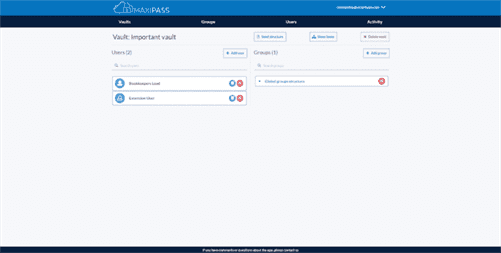They advocate carefully rethinking how that one key business function can benefit from AI rather than attempting to implement AI solutions across the company. The pandemic has clearly proven that the rational decision-making model, business schools’ ideal and its theoretical definition of how decisions should be made, is not valid under conditions of VUCA. Brainstorm with different departments such as sales, finance, marketing, production, etc. to get the answer to these questions. Once you know the answers, you can easily define your business goal and move ahead with the next step. AI solutions for businesses increasingly face legal regulations with their ever-growing prominence. Thus, companies need to abide by these restrictions and governance standards, particularly if they operate in highly regulated sectors such as healthcare and finance.
MSA is the second largest metropolitan area in the U.S. and the third largest metropolitan area in the world. There are lingering effects as the economy kicks back into high gear after the Covid crisis — issues with items from semiconductors to lumber have been in short supply due to disruptions caused by the crisis. Analytics and AI help companies predict, prepare, and see issue that may disrupt their abilities to deliver products and services. Businesses are still relying on manual methods to monitor their supply chains — those that adopt AI in the coming months and years will achieve significant competitive differentiation.
What are the primary benefits of AI for businesses?
AI has made inroads into phone-call handling, as 36% of respondents use or plan to use AI in this domain, and 49% utilize AI for text message optimization. With AI increasingly integrated into diverse customer interaction channels, the overall customer experience is becoming more efficient and personalized. Increased transparency is needed to build trust, but siloed data is obscuring leaders’ ability to lean in.
AI applications in business widely suggest the right products to users through vast data analysis. If you are on an online shopping spree, you might already be aware of how AI recommends products to users. Artificial intelligence leaves a transformative impact on businesses, enabling them to conduct market research, analyze trends and gain competitive intelligence to quickly redefine their marketing strategy and drive growth. Furthermore, this data can be refabricated to determine customer preferences and fulfill demands.
Conclusion: What Business Can Expect from AI in the Future
Without obvious restrictions on what a customer can ask for in an input box, the AI needs to have guidelines that ensure it responds appropriately to things beyond its means or that are inappropriate. This amplifies the need for a sharp focus on the rules layer, where the experience designers, marketers and business decision makers set the target parameters for the AI to optimize. Data from across a company, from partners, or from sellers of data, can be integrated and then used for modeling in a flash. Companies can use AI to recommend products that will align with customers’ interests and keep them engaged.

Son, who founded SoftBank and is a leading figure in Japan’s business world, has enjoyed both victories and defeats in his array of technology investments. He latched on to the potential of the internet decades ago, and now is seeking to invest in AI-related companies. So far as I can tell, Vera’s value proposition is that it tackles a whole range of generative AI threats at once — or promises to at the very least. Assuming that the tech works as advertised, that’s bound to be attractive for companies in search of a one-stop content moderation, AI-model-attack-fighting shop. Utilizing a foundation model from Microsoft, Open AI, Google is not possible without considerable time and effort and expense.
Third, bring Machine Learning engineers on board
Inaccurate or irrelevant data can hamper the smooth functioning of AI applications. Ensuring data is clean, relevant, and accessible can be the biggest challenge when embracing AI in business. Computer Vision enables machines to understand and interpret visual information from images or videos. For instance, the retail industry utilizes computer vision to identify products, track inventory, and automate the checkout process. Artificial intelligence encompasses various technologies such as Machine Learning, Deep Learning, Natural Language Processing (NLP), Computer Vision, Robotics Process Automation, etc. While all these technologies are closely related, they have distinct functions and use cases in businesses.

Some stakeholders and employees are resistant to AI adoption as they don’t have a deep understanding of the real potential of AI implementation and are afraid of job displacement. In other terms, AI enables organizations to do competitive intelligence and gain valuable data about their current and future competition. Therefore, by leveraging AI for business operations, businesses can quickly track what their competitors are doing and what makes them stand out of the crowd. Sales forecasting can be done by implementing AI-based CRM software in the business. It helps analyze CRM data, purchase history, etc., and find out how each data element, such as email, customer calls, etc., is related to sales performance.
Concerns Business Owners Have Using Artificial Intelligence
Artificial Intelligence considered all the above factors when determining the optimal price of the product. In simple terms, AI can help you make the best price decisions for every product. Sales forecasting is a vital process of estimating and predicting future sales for long-term business growth. Through sales forecasts, one can detect potential ai implementation problems and take proactive measures to avoid them. Also, accurate sales forecasts can help businesses calculate the probability of future customer purchases and predict long and short-term performance. Chatbots are directly contributing to digital business growth and are among the most promising trends in customer engagement and user experience.
- For many companies around the world, it has become a core part of their operations.
- This allows them to finish the projects on schedule and prevent additional costs.
- Investment or adoption of generative AI in software development clocked the highest rate, at 21%, followed by marketing and customer service at 19% and 16%, respectively.
- The world’s largest furnishing chain uses an ERP solution that helps both customers and companies.
- While 98% believed there would be some immediate business benefit from deploying AI and machine learning, 49% said their organization was unprepared to do so due to a lack of tools, skills, and knowledge.
- Inaccurate or irrelevant data can hamper the smooth functioning of AI applications.
- The big firms, Sawhney said, will need people who are conversant enough in the technology to spell out the business value of AI and convince a Fortune 500 CEO to spend perhaps millions on an AI project with a consulting company.
Taking the help of an offshore firm that provides AI consulting is a feasible and cost-effective option compared to creating an in-house AI team from scratch. It might help you get a clearer picture of how AI can boost the business and increase ROI. Do you know that almost 80% of executives think that artificial intelligence applications will simplify their jobs and make them more efficient at work? Then applying the experience to form solutions for bigger and more complex tasks. Such a solution could be used for everything from answering FAQ questions to tracking employee performance and time on task – being a cost-effective, highly efficient and useful replacement for legacy systems. The client was a key player in HR consulting, with more than 10,000 employees.
Strong Competitive Analysis
The ever-growing competition and customer expectations and complexity urge businesses to innovate continuously. AI can support their strategic planning and decision-making by generating actionable insights from customer data. Similar to Vera, Nvidia’s NeMo Guardrails and Salesforce’s Einstein Trust Layer attempt to prevent text-generating models from retaining or regurgitating sensitive data, such as customer purchase orders and phone numbers. Microsoft provides an AI service to moderate text and image content, including from models. Elsewhere, startups like HiddenLayer, DynamoFL and Protect AI are creating tooling to defend generative AI models against prompt engineering attacks.

To get started with AI, it’s important to first gain an understanding of how data collection and analysis plays into artificial intelligence. By studying the methodology behind AI, you can better determine how AI might be able to help your industry. An introductory AI course such as Wharton Online’s Artificial Intelligence for Business program can be a great jumping-off point for anyone wanting to learn more about how AI is transforming the world of business. According to Forbes, the amount of data created and consumed increased by 5000% between 2010 and 2020. With the help of emerging technologies, companies are now able to capture user data that can help them make informed business decisions.
Discover tech and soft skills you’ll probably need for your microservices project.
AI comes into play in terms of predicting how customers will respond to specific advertisements. When you think about artificial intelligence being used by businesses, your mind likely jumps to automation. While some applications of AI do involve automating processes that were originally completed by humans, that only scratches the surface of what AI and machine learning can do. AI and ML models are used to understand the business by tracing patterns in historical and real-time data. From predicting product demand to planning distribution, AI plays a vital role in assisting the management make better decisions.

